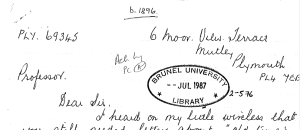May Owen (b.1896): Purpose and Audience

May Owen wrote her autobiographical letter as she neared the age of eighty in the year 1976. Owen most likely decided to send the letter in as she reflected upon her life as she may have believed she did not have long left although, since I have not discovered a record of her death, this cannot be verified.
Owen wrote her ten page handwritten letter to Professor John Burnett who was searching for information about the ‘old times’ (p.1) and collecting memoirs from the Nineteenth and Twentieth Century to discover more about it. Owen’s life started in the late 19th century and she grew up in the 20th century going through two world wars. Owen mentions only the First World War when she joined the Land Army and some of her roles she had during that time.
Owen down plays her life greatly in her memoir and suggests that the Professor will take no interest in her life as she puts forward that he may ‘destroy [her] letter’(p.1) if it is of no use in finding out information about the past. Owen has no confidence that her letter will be fascinating to a Professor as at the end of her letter she writes ‘P.S. You need not acknowledge this […] I am sure you will be bored.’ This is typical of many working-class writers as typically autobiographies are written by acclaimed writers or people of influence. If only May Owen could see that her letter inspired this blog!
Regina Gagnier says in her article, Social Atoms: Working-Class Autobiography, Subjectivity, and Gender that working-class people ‘state that their reasons for writing are functional rather than aesthetic: to record lost experiences for future generations; to warn others; to teach others; to relieve or amuse themselves; to understand themselves.’(p.342) which is exactly what Owen does as she writes down her life to pass on information of her experiences of the past to the next generation to help with their understandings of it.
Owen’s letter was sent in to Professor Burnett and not to a relative so her tone of voice is brief and she tends to stick to the facts rather than indulge any emotion into it. Even when mentioning her husband’s death she just states that he died and at what year but the reader doesn’t get to know what that meant for her other than having to go back into the work place. Owen only adds in her emotion when describing little things like her disliking for her employers or superiors but never goes further as she believes that the Professor is not looking for how she felt about anything but rather just to give a document of facts of the ‘old times’ (p.1).
Bibliography
May, Owen. Autobiographical Letter. Burnett Archive of Working Class Autobiography, University of Brunel Library, Special Collection, 2:576
Gagnier, Regenia. ‘Social Atoms: Working-Class Autobiography, Subjectivity, and Gender’ Victorian Studies, Vol.30, No.3. Indiana University Press. Web, accessed 5/10/2015, www.jstor.org/stable/3828397. Spring, 1987. Pp 335-363.
Picture: May Owen Letter.

Leave a Reply